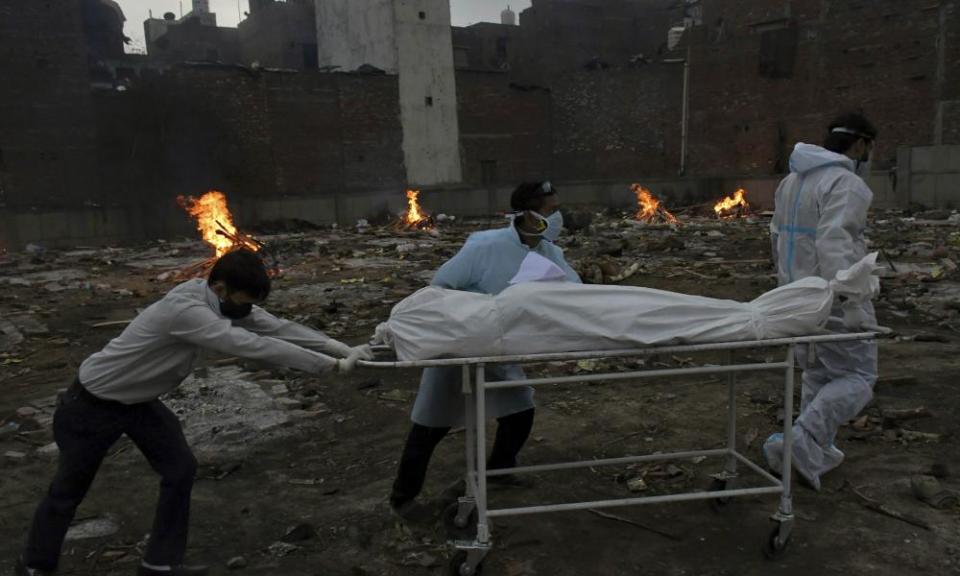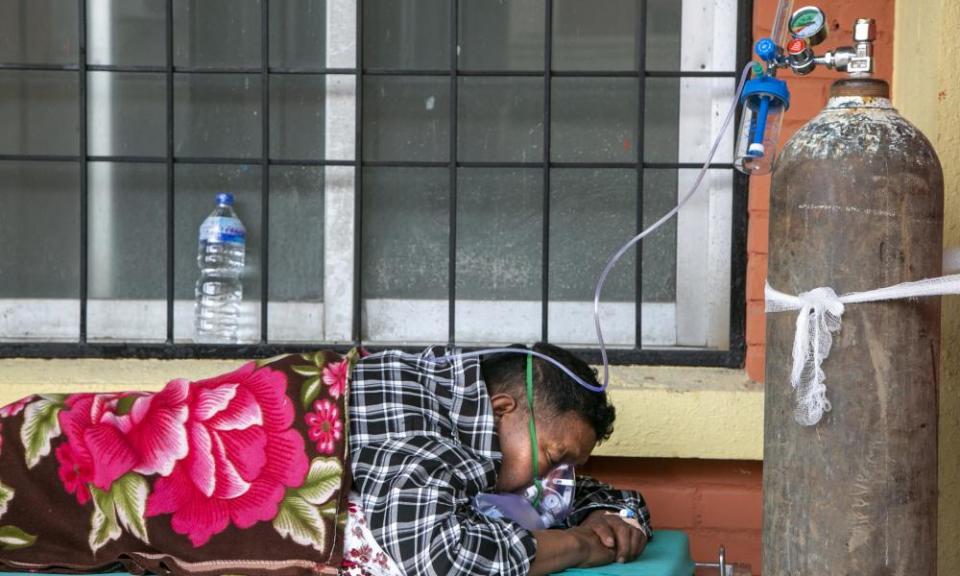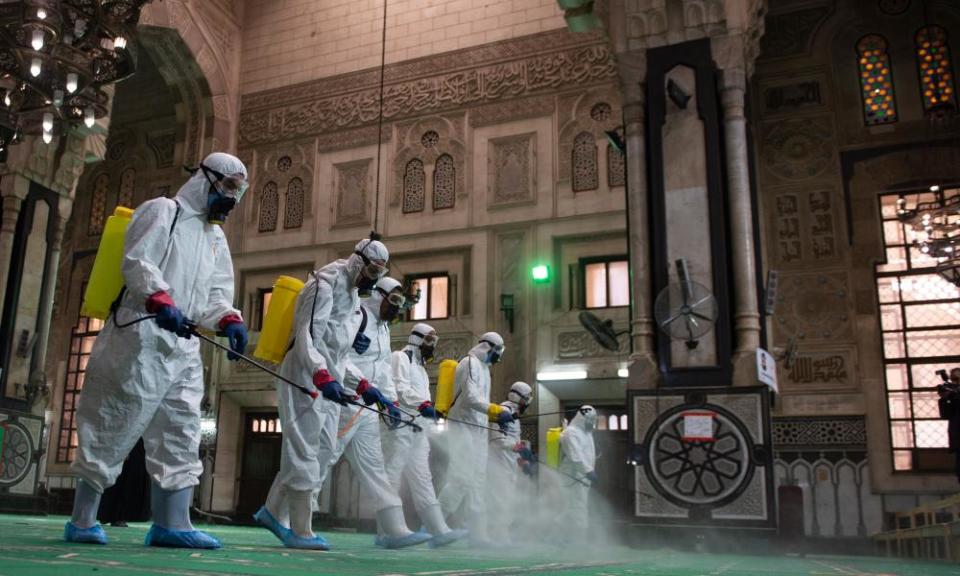Picture of two pandemics: Covid cases fall in rich west as poorer nations suffer

The past seven days has been a picture of two pandemics. Among the world’s richest nations, lockdowns and well-resourced vaccine campaigns, which have monopolised the early global supply of doses, have brought down infections and deaths. Economies have slowly opened. Restrictions have been lifted. Life has crept closer to normal, giving the false impression of an end in sight to the global pandemic.
In reality, as the head of the World Health Organization, Tedros Adhanom, pointed out, more cases have been reported in the past two weeks than in the entire first six months of the pandemic, with south Asia bearing the brunt.
This was echoed by the UN children’s agency Unicef on Friday. “The pandemic is far from over,” it said. “Covid-19 cases are rising at an alarming rate across south Asia, especially in Nepal, Sri Lanka and the Maldives. Entire health systems could collapse, leading to more tragic loss of life. Besides south Asia, we are also seeing alarming situations in other parts of the world.”
As India once again broke global records for new cases (414,188) and deaths (3,915), the question of how to characterise and respond to an emerging two-speed world has occupied international leaders.
At the forefront has been the vexed question of how to increase vaccine production and delivery to ensure a fairer distribution, with only 0.2% of the 700m vaccines distributed so far going to low-income countries.
Gordon Brown, the former British prime minister, speaking at a World Health Organization briefing at the beginning of the week, said: “This is a manmade catastrophe. By our failure to extend vaccination more rapidly to every country, we are choosing who lives and who dies.”
By the middle of the week the campaign to waive patents on vaccines, backed by Brown, had drawn the backing of Biden administration and, somewhat less forcefully, the EU.
The reality, as experts have pointed out, is that extending vaccine equity to the developing world is likely to be more complicated.
The recent catastrophic resurgence of coronavirus in south Asia, and India and Nepal in particular, has been driven by more complex factors than simply a shortage of vaccines, not least in India, whose Serum Institute, the world’s biggest producer of vaccines, is already licensed to produce the AstraZeneca vaccine.
The spread of the virus at the national level and within countries has been dictated by multiple issues, including demographics, political decisions over prevention and mitigation measures, and the relative strength or fragility of health systems. In the developing world other factors have included the failure to distribute what vaccines have become available and vaccine hesitancy.
All of this has been underlined by a WHO warning that African countries were vulnerable to a similar coincidence of circumstances that has led to the current crisis in south Asia.

“The delay in the delivery of vaccine doses from the Serum Institute of India earmarked for Africa, the delay in the deployment of vaccines and the emergence of new variants, means that the risk of a new wave of infections remains very high in Africa,” the WHO’s Africa regional office said in a statement on Thursday. It said new variants, such as the ones that emerged in India and South Africa, could unleash a “third wave” on the continent.
Already there are worrying signs in Egypt, which this week imposed tight new restrictions, after average daily new cases doubled from about 500 in early February to just over 1,000, and epidemic hotspots emerged in the southern province of Sohag and in Cairo.
“The tragedy in India does not have to happen here in Africa, but we must all be on the highest possible alert,” Matshidiso Moeti, the WHO’s regional director, said. “While we call for vaccine equity, Africa must also knuckle down and make the best of what we have. We must get all the doses we have into people’s arms.”
Some African countries had been exemplary in deploying vaccines, the WHO said, without naming them. But it added that in spite of this, only just under “half of the 37m doses received in Africa have been administered so far”.
Africa now accounts for only 1% of vaccine doses administered globally, the WHO said, down from 2% a few weeks ago, as other regions’ vaccine distribution programmes are progressing much faster.
The first vaccines deliveries to 41 African countries under the Covax scheme began in March, but nine countries have so far administered only a quarter of the doses received, while 15 countries have used less than half of their allocations.
There are worries about how errors in anticipating second and third waves of the virus, marked by the emergence of the new and more contagious variants, could affect the most vulnerable countries in the developing world. Writing in the New York Times, Esther Duflo and Abhijit Banerjee, who won the 2019 Nobel prize for economic sciences for their work on alleviating poverty, said action needed to be taken now to anticipate where Covid-19 would strike next.
“Most critically, however, we should anticipate the possibility that the virus will spread through Africa, where a vaccination campaign that had barely started is now endangered by the situation in India, which stopped exporting vaccines many countries were relying on.
“This would bring disaster in countries where oxygen supplies and hospital beds are extremely limited. The United States and Europe need to get ready to act quickly when necessary. This means shipping and making vaccines as fast as possible, and perhaps even more urgently, this means investing in global surveillance and testing, and being prepared to ship oxygen and equipment and to provide financial support for people in lockdown.”
That message was reinforced by Anthony Fauci, the Biden administration’s chief medical adviser, who – while welcoming the patent waiver initiative – said that in the interim the west needed to support vaccine companies in increasing production to make vaccines available for the developing world.

“I am certainly not against anything that can get doses of vaccine quickly into the arms of people in the developing world,” Fauci told Politico. “I feel very strongly that we have a moral obligation as a rich nation, to really put our forces in our resources into helping those who would otherwise die because they happen to be in a country that they were born in.
“Having been through a horrible situation, with close to 600,000 people in [the US] having died, we want to feel really comfortable that we have absolutely interrupted the chain of transmission before we do anything else.
“You can ramp up production, by investing resources into the companies that are already doing it. And you can do it in a way to say ramp it up, but it’s going to be for the developing world in addition to us,” he said.

 Yahoo Movies
Yahoo Movies 